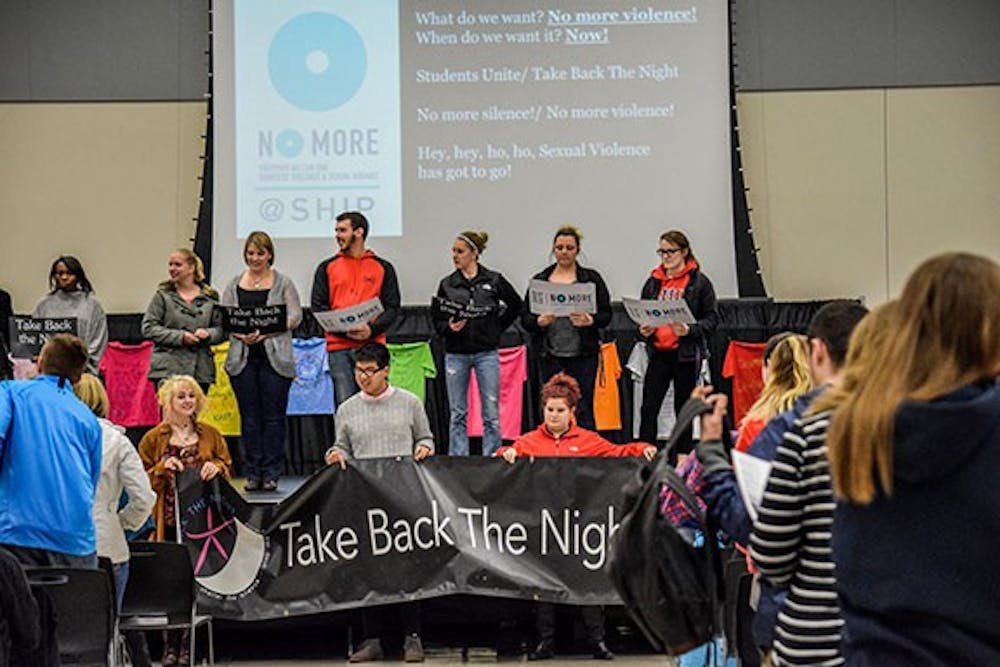The words of a few can heal the scars of many. During Shippensburg University’s Take Back The Night, the stories of rape and abuse pierced the deafening silence of the evening, bringing survivors together.
The SU Women’s Center hosts Take Back The Night each year to bring attention to domestic violence and sexual assault. Women in college are three times more likely than nonstudents to encounter sexual violence, according to the Rape Abuse & Incest National Network (RAINN). College men are 78 percent more likely to become victims. Other universities like SU have hosted Take Back The Night events, some for the past 30 years.
On April 5, members of SU and the community gathered in the Ceddia Union Building (CUB) multipurpose room to rally for an end to violence, followed by a march through campus and a speak-out in the CUB amphitheater.
Roger Serr, SU vice president for student affairs, applauded the university for its work with the Ship Says No More campaign, which advocates for an end to sexual violence on campus.
The newest members of Rape Educators and Contacts (REACT) received recognition for completing more than 20 hours of training. REACT works to help victims of sexual violence and educate the campus on the topic.
Lindsey Smith, known as the “food mood girl” for her published books on nutrition and health, served as the evening’s keynote speaker. While Smith’s expertise in healthy living could relate to the theme of Take Back The Night, she did not come to SU just to talk about her job. She came as a former victim, ready to share her story of pain and recovery.
Smith described herself in high school as the quintessential popular student. She was a cheerleader, homecoming queen and considered “the good girl.” At 17 years old, Smith’s world drastically changed when she woke up after a night of drinking — and found herself lying in bed next to her friend’s cousin.
“All I remember was waking up the next morning, completely naked, next to her male cousin,” Smith said.
The night was a blur, and Smith had no idea what occurred while she was inebriated. She left the house blaming herself.
“I’m tainted. My body is now disgusting,” Smith said in the CUB, echoing her younger self’s thoughts.
Smith kept the night a secret until six years later when she was talking to a client at work. The client had a similar experience, which prompted Smith to reveal her long-kept secret for the first time. Today, Smith openly shares her story through the media, in the hope that she can help victims.
“For years, I carried around this pain and this guilt,” Smith said.
While Smith worked through her recovery, she also found sobriety. The single event that happened when she was 17 caused her to become dependent on alcohol.
Victims of sexual assault are 13 times more likely to abuse alcohol, according to RAINN.
Smith encouraged students at SU to share their own stories, calling them the most courageous act one can do. While millions of sexual assault cases have been reported, there are many victims who do not come forward. Take Back The Night highlighted two organizations that help men and women who find themselves in these unsafe situations.
Dana Hippensteel, a member of the YWCA in Carlisle, and Brittany Leach of Women In Need spoke about the resources their organizations offer. Each has a 24-hour hotline and counseling services available, along with other services.
Leach identified herself as a survivor of violence, reminding the SU community how many survivors there are in the world. Anywhere she goes, Leach said she knows that she will run into at least one person who shares a similar experience.
Leach often hears people say that sexual violence is not a problem in their area, which perpetuates the problem.
“In order for us to do prevention, our communities need to wake up,” Leach said. “I want you to think about this as taking back your college campus.”
After practicing a few chants in the multipurpose room, the crowd filed out of the CUB, armed with Take Back The Night and Ship Says No More posters. Walking through campus, students yelled, “No more silence, no more violence! Students unite, take back the night!” Passersby turned their heads toward the marchers. Some parted the blinds in their residence halls to find the source of the noise.
Yelling subsided and feet stopped moving once students circled back to the CUB amphitheater, where a microphone stood ready for the speak-out. Survivors or people touched by sexual, emotional and physical violence stepped forward to tell their stories. Some people spoke for the first time, choking out their words. A few grabbed the microphone to convey their support. Others told their story, not for the first time, hoping to encourage more people to speak out.
A candlelight vigil ended Take Back The Night. The crowd shielded their candles from the wind as they stood still for a moment of silence, honoring those who have suffered. The flames went out, and some students lingered to talk with or hug their friends.
Devin Rideout, a junior social work major, attended Take Back The Night to see an example of public speaking for his class, but also because he felt a personal connection to the event.
“I praise everyone who gets out and stands there in front of people,” Rideout said. “Out here, you hear exactly what’s happening — no sugarcoating.”




The Slate welcomes thoughtful discussion on all of our stories, but please keep comments civil and on-topic. Read our full guidelines here.